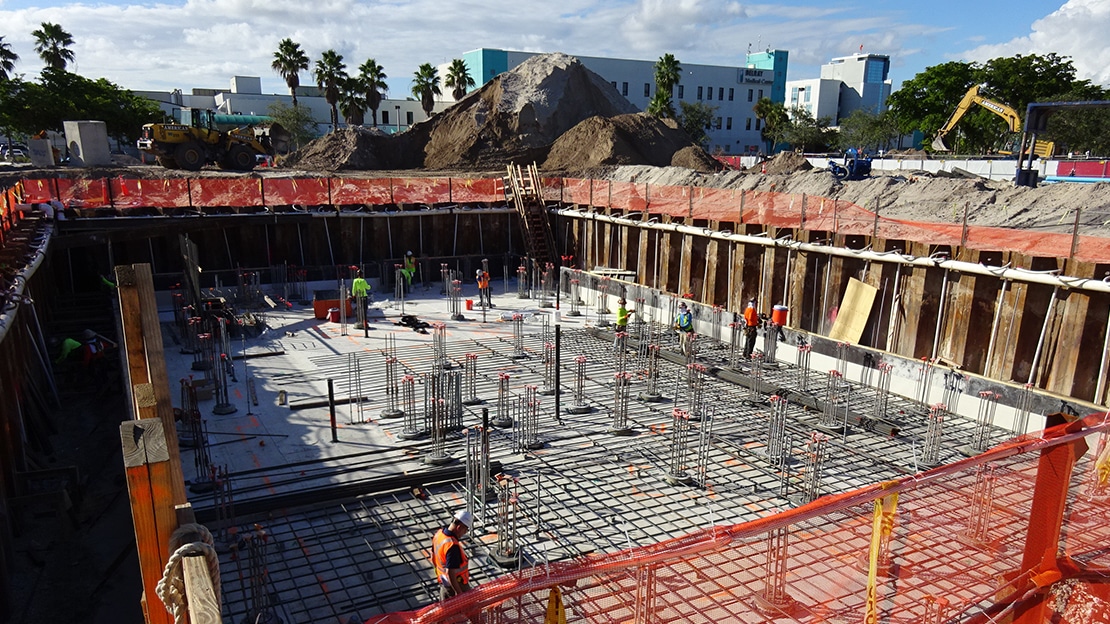Find an office location
More than 175 offices from coast to coast.

Proton therapy is a fast-growing healthcare technology that requires a specialized construction approach. An advanced form of radiation therapy, proton therapy is highly effective and typically causes fewer side effects in patients than other cancer treatments. This technology is gaining popularity due to its ability to target cancer cells without harming healthy cells, and many new centers are being proposed worldwide. Construction of these specialized cancer treatment facilities are multi-faceted with complex requirements that require coordination by an experienced team.
Terracon focuses on geotechnical engineering, building enclosure consulting, and materials testing, including special inspections, for projects housing various types of radiation therapies used by hospitals, including proton therapy. Each healthcare facility offering proton therapy has unique requirements, so every project plan must be tailored accordingly.
Whether being installed in a new or existing facility, proton therapy equipment is very sensitive to vibration and therefore requires unusually thick foundation walls, sometimes up to 10 feet thick. Additionally, the precision treatment delivered via proton therapy equipment must have an ultra-stable platform, so vibration control should be used during construction in both existing and new facilities. Proton therapy equipment manufacturer’s published vibration tolerances are very small so an understanding of these requirements is critical in designing and conducting foundation installations, especially in or adjacent to existing facilities. Mistakes can result in the need for very costly recalibration of the proton therapy equipment and result in significant delays for badly needed treatment for patients.
Avoiding moisture intrusion is also a consideration for installation of proton therapy equipment, even more so when this sensitive equipment is installed in below grade areas of a facility. Terracon provides pre-construction consulting to evaluate the proposed building enclosure (roofs, walls and below-grade waterproofing) designs and systems and provides recommendations to protect this very sensitive equipment. During construction, submittal review and site observations document that installation quality meets the intended design. Specialty testing (air and water penetration) is also conducted to ensure the building enclosure systems will perform as intended.
Protecting patient health and safety during construction is important when proton therapy treatment equipment is planned for hospital expansions because the rest of the facility must keep running during construction.
Foundations require special attention during construction of facilities to house proton therapy equipment. Typically, the equipment chamber is constructed first, the equipment is installed, and then walls are built surrounding the equipment. Even expansions comprised of only one or two stories need to be treated as multi-story due to the loads on the foundation. For one recent project, Terracon’s team evaluated the existing pile foundation and recommended improvements due to very loose soil conditions at a depth of 30 feet.
Proton therapy facilities are a very specialized type of building use, requiring specialized understanding and expertise during the design and construction process. Terracon’s capabilities are well suited to assist healthcare building owners.
The proton therapy facility at Florida Hospital Altamonte provides an example of this kind of project. The Terracon team provided standard materials testing and special inspections of the facility addition, including the reinforcing steel in the large concrete box encapsulating the equipment.
Thickness of the walls and roof were inspected to verify that no cracks would form in the concrete due to temperature differentials or shrinkage in the concrete. Cracks must be avoided because they can fail to contain protons during equipment use.
Terracon’s work at the Altima facility was performed while the hospital was in operation, requiring the relocation of an existing ambulance loop outside the building. The team’s experience with the complexities of this type of project, the relationships with the client and contractors, and our ability to be responsive were factors in the successful complement of the project.
Proton therapy is an advanced form of radiation therapy that is non-invasive and uses a single beam of high-energy protons to treat various forms of cancer.
Benefits:
More than 175 offices from coast to coast.